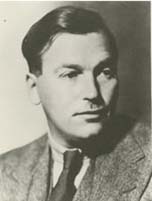
Richard (real name Edward Godfrey) Aldington was an English poet, novelist, and critic. He was born in Portsmouth in a family of lawyers. He studied at Dover College and the University of London. Due to financial constraints, he was unable to obtain a degree. In 1911 he met his future wife, the poetess Hilda Doolittle.
He began his literary career in 1912 as a poet, he became famous as a member of the Imagist circle. During 1914-1917 he was the editor of “The Egoist magazine”. Richard Aldington's early poems, which were notable for their extraordinary verbal precision, were published under the title Pictures.
In 1914 the Imagists published an anthology of their poetry, "Des Imagistes". Of the 37 poems in the anthology, ten were by Aldington.
Aldington is recognized as one of the main representatives of Imagism as a literary movement. He was a lyric poet by temperament, and a seeker of beauty in everyday life by aspiration. Aldington stayed away from the typical for those times fascination with decadent mysticism and egocentrism. He translated ancient Roman and Greek poets as well as European modernism.
In 1916 Aldington, together with the writer John Cournos, translated into English Fyodor Sologub's novel The Petty Devil.
Richard Aldington was a participant in World War I. In 1916 he began serving as a private, was attached to the Royal Sussex Regiment, was later made an officer and served on the Western Front. In 1917 he was wounded and treated in hospital.
The war drastically changed Aldington's outlook, leaving the mark of harsh bitterness and hopelessness on all his later work. His book of poems, “Images of War”, is one of the best books in the history of English-language poetry. The field of the writer's work has also changed radically: in addition to poetry, he began to pay more attention to prose. His novels and short stories are imbued with aversion to war. Aldington was also very concerned with the problem of the environment, he became one of the first novelists of the century who wrote about the environmental problems of the modern world. Aldington paid even more attention to nature and its effect on people, especially people who were extraordinary.
In his twenties Aldington, before known mainly as a poet, began to pay increasing attention to prose. His novel Death of a Hero, partly autobiographical, is now among the best-known anti-war novels, along with those of Remarque and Hemingway. A book of novels, “Soft Answers”, continued this line in the writer's work. His next novel, “All Men Are Enemies”, is also imbued with an aversion to war.
In the mid-1940s the writer moved to the United States, where he began to write biographies. The classic work of literature of the "lost generation" was Richard Aldington's “Death of a Hero” (1929), his first and most famous novel. It was translated into many languages and brought the writer well-deserved recognition, as did his subsequent “The Colonel's Daughter” (1932), “Very Heaven” (1937), and “Seven Against Reeves” (1938). The short story collection “Roads to Glory” (1930) and the novel “All Men Are Enemies” (1933) are distinguished by their passionate condemnation and satirical debunking of hypocritical society.
One of the most erudite writers of his time, Richard Aldington also translated and published literary criticism-articles, memoirs, essays. In particular, in 1930 he published a translation of "The Decameron".
Aldington's last major works were the biographies “Lawrence of Arabia: A Biographical Inquiry” (1955), which exposed Thomas Edward Lawrence, the colonel of British intelligence and a favorite of the British public, and “Portrait of a Rebel: The Life and Work of Robert Louis Stevenson” (1957).
PolnikovAlexey,
librarian of the Department of the International Book

